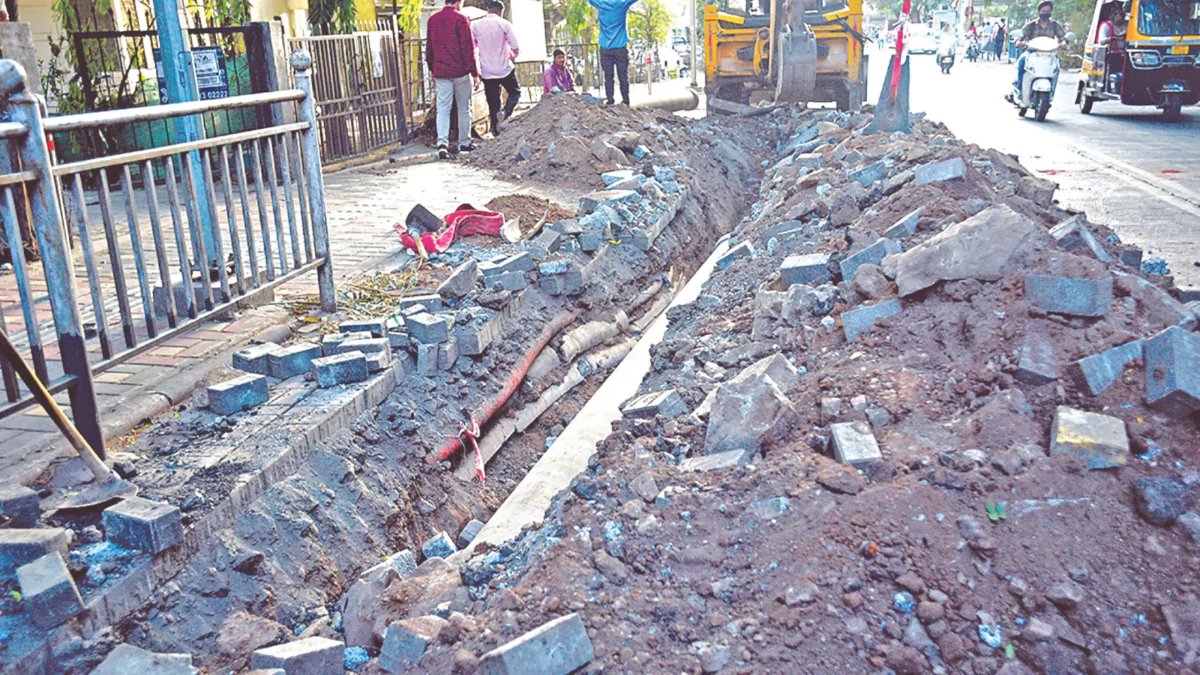The Pune Municipal Corporation (PMC) has reverted to directly procuring asphalt from manufacturers, stepping away from contractor-mediated purchases.
The shift comes in the aftermath of serious allegations of malpractice in the asphalt procurement process—an area where the civic body annually spends crores to maintain Pune’s road network. The order was issued by the municipal commissioner following public concerns raised by elected representatives over the earlier procurement model, which routed material through private contractors. This shift back to direct sourcing not only reaffirms the civic administration’s commitment to procedural integrity but also signals a broader intent to insulate critical infrastructure functions from opaque middlemen practices.
A civic official involved in the decision highlighted that the PMC consumes nearly 3,000 tonnes of asphalt annually for road resurfacing and pothole repairs across the city. During the tenure of a previous commissioner, this procurement was shifted to a contractor-led model. The change was allegedly implemented without adequate oversight, which, according to insiders, opened the door to inflated pricing, substandard material supply, and potential misappropriation of funds. The allegations, brought to light by a former standing committee leader, prompted the current municipal leadership to launch an internal inquiry. A fact-finding committee, headed by the road department chief, has been constituted to examine the trail of transactions and assess if there were any lapses in past procurements. The civic administration, in parallel, has already initiated the process of buying asphalt directly from reputed manufacturers to ensure quality assurance and cost efficiency.
The move has been welcomed by urban planning experts and citizen forums that have long advocated for eliminating third-party agents from public procurement processes. As cities like Pune strive to become more sustainable, transparent governance in basic infrastructure provisioning—such as roads—remains a cornerstone of public trust and equitable urban development. Road infrastructure is among the most visible indicators of government efficiency, and poor quality repairs have a cascading effect on daily commutes, vehicular emissions, and overall city mobility. In this context, ensuring high-grade materials and timely repair work is not merely a matter of civic aesthetics, but also of environmental sustainability and urban resilience. Every poorly executed road stretch means longer traffic snarls, increased fossil fuel usage, and elevated carbon emissions. With a clear message now sent, the PMC’s decision is expected to set a precedent for procurement across other urban bodies in Maharashtra and possibly beyond. Whether the committee’s findings lead to systemic reforms or disciplinary action remains to be seen, but the immediate course correction has already brought a measure of confidence among residents wary of opaque civic spending.
In a city that is fast urbanising and aspiring to lead India’s green mobility agenda, eliminating procurement irregularities is a step not only toward better governance, but also toward building an equitable and eco-conscious future. The Pune Municipal Corporation (PMC) has reverted to directly procuring asphalt from manufacturers, stepping away from contractor-mediated purchases. The shift comes in the aftermath of serious allegations of malpractice in the asphalt procurement process—an area where the civic body annually spends crores to maintain Pune’s road network.
The order was issued by the municipal commissioner following public concerns raised by elected representatives over the earlier procurement model, which routed material through private contractors. This shift back to direct sourcing not only reaffirms the civic administration’s commitment to procedural integrity but also signals a broader intent to insulate critical infrastructure functions from opaque middlemen practices. A civic official involved in the decision highlighted that the PMC consumes nearly 3,000 tonnes of asphalt annually for road resurfacing and pothole repairs across the city. During the tenure of a previous commissioner, this procurement was shifted to a contractor-led model. The change was allegedly implemented without adequate oversight, which, according to insiders, opened the door to inflated pricing, substandard material supply, and potential misappropriation of funds.
The allegations, brought to light by a former standing committee leader, prompted the current municipal leadership to launch an internal inquiry. A fact-finding committee, headed by the road department chief, has been constituted to examine the trail of transactions and assess if there were any lapses in past procurements. The civic administration, in parallel, has already initiated the process of buying asphalt directly from reputed manufacturers to ensure quality assurance and cost efficiency. The move has been welcomed by urban planning experts and citizen forums that have long advocated for eliminating third-party agents from public procurement processes. As cities like Pune strive to become more sustainable, transparent governance in basic infrastructure provisioning—such as roads—remains a cornerstone of public trust and equitable urban development.
Road infrastructure is among the most visible indicators of government efficiency, and poor quality repairs have a cascading effect on daily commutes, vehicular emissions, and overall city mobility. In this context, ensuring high-grade materials and timely repair work is not merely a matter of civic aesthetics, but also of environmental sustainability and urban resilience. Every poorly executed road stretch means longer traffic snarls, increased fossil fuel usage, and elevated carbon emissions. With a clear message now sent, the PMC’s decision is expected to set a precedent for procurement across other urban bodies in Maharashtra and possibly beyond. Whether the committee’s findings lead to systemic reforms or disciplinary action remains to be seen, but the immediate course correction has already brought a measure of confidence among residents wary of opaque civic spending.
In a city that is fast urbanising and aspiring to lead India’s green mobility agenda, eliminating procurement irregularities is a step not only toward better governance, but also toward building an equitable and eco-conscious future.
Also Read :https://urbanacres.in/new-infrastructure-projects-to-accelerate-kanpurs-growth/
Pune Takes Control of Road Repair Supplies


